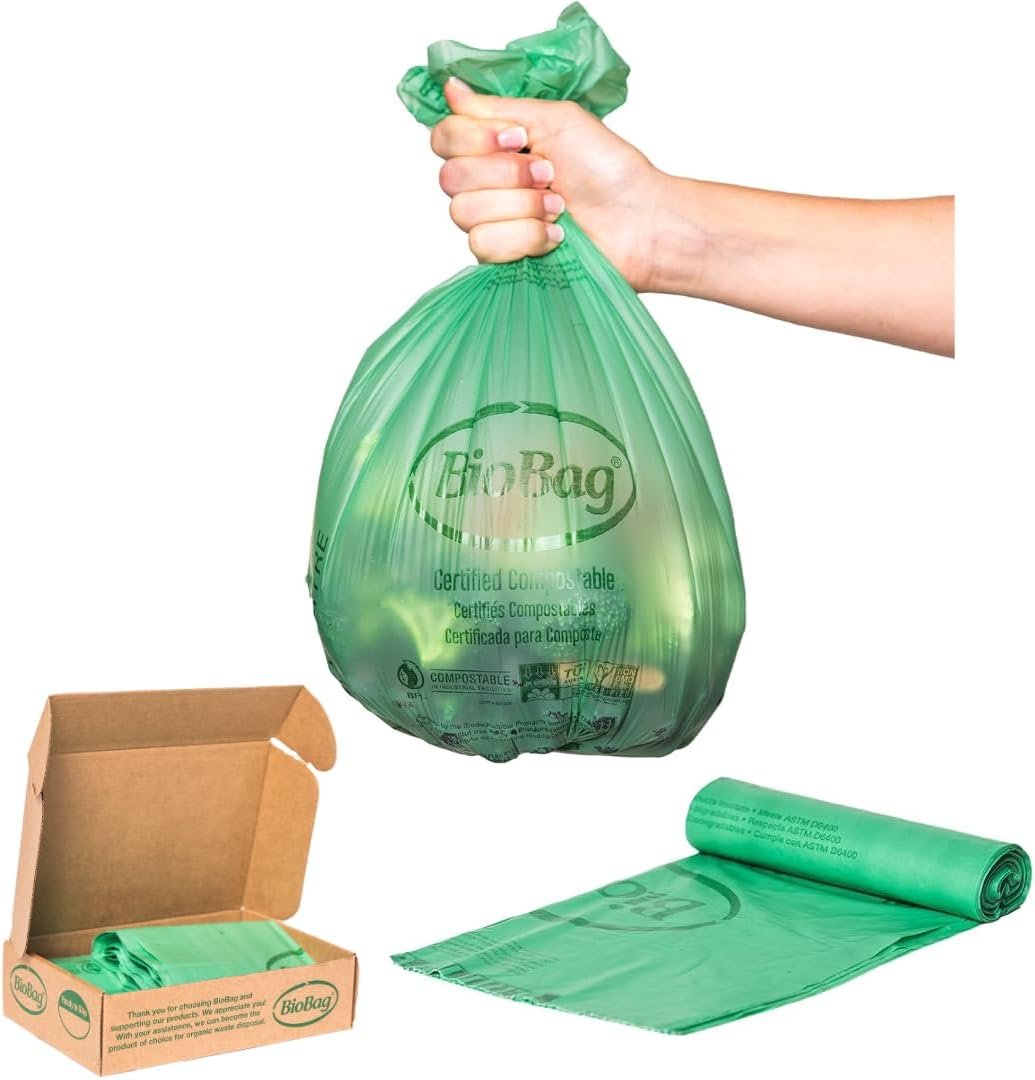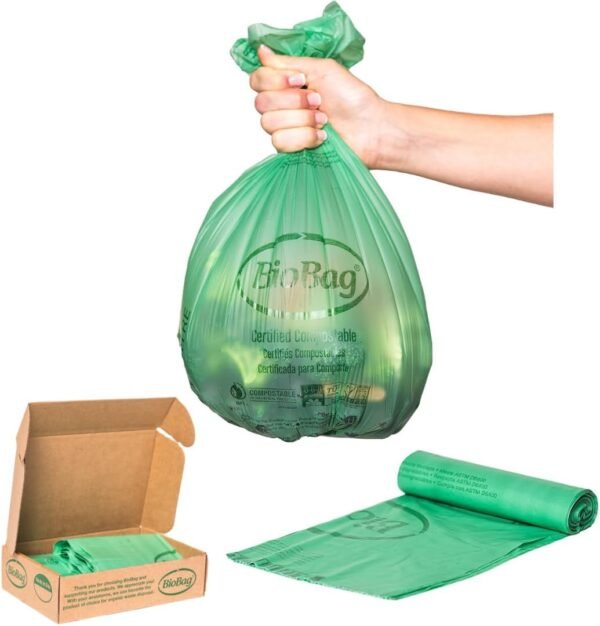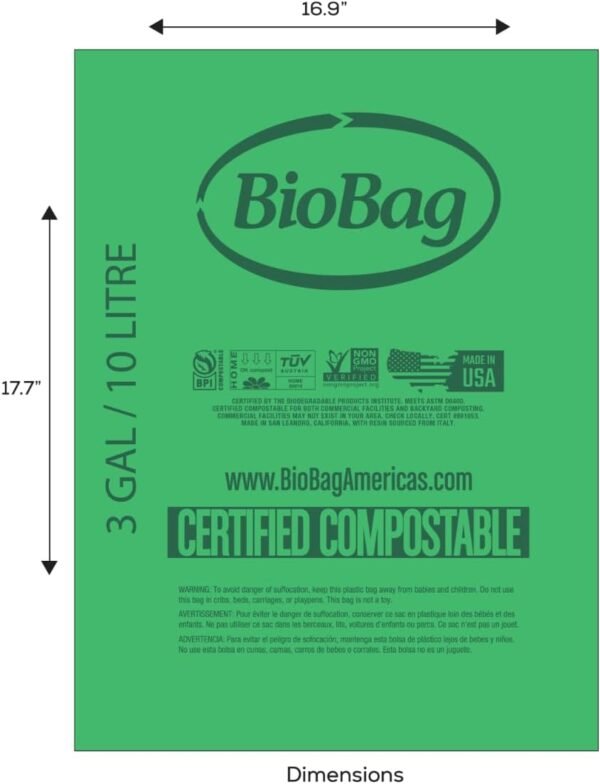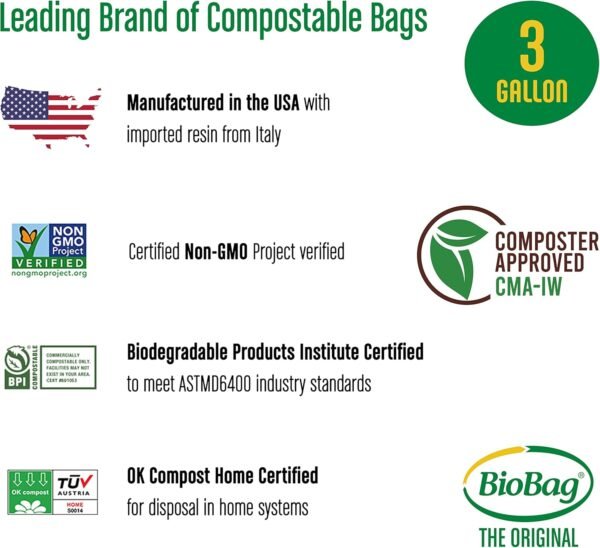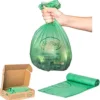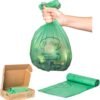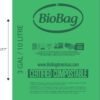Compost Bags BioBag Review Sustainable Kitchen Compost Bin Compatible Eco Friendly
Compost Bags BioBag Review Sustainable Kitchen Compost Bin Compatible Eco Friendly
- 100 count of compostable bags designed to fit most kitchen compost bins, ensuring convenience and reducing mess.
- Made from plant starches and vegetable oils, these bags break down naturally without leaving harmful residues.
- Certified compostable by a recognized institute, meeting strict environmental standards for home composting.
- The packaging itself is eco-friendly, minimizing waste and aligning with sustainable values.
As an Amazon Associate I earn from qualifying purchases.
Description
Positive Features of the Compostable Kitchen Bags
Having tested the BioBag (USA), The Original Compostable Bag, 3 Gallon, 100 Total Count, 100% Certified Food Scrap Bags, Kitchen Compost Bin Compatible, I have to say the eco-friendly aspect really stands out. These bags are made from plant starches, vegetable oils, and compostable polymers, which means they break down naturally in a home compost system without leaving harmful residues. This is a huge win for anyone serious about reducing plastic waste in their kitchen. The bags fit well in most kitchen compost bins, ensuring that food scraps stay contained and the bin stays clean. Their size of 16.9 inches by 17.7 inches and thickness of 0.64 mil strike a nice balance between durability and flexibility. Plus, the fact they come in packs of 100 means I rarely have to restock, which is convenient.
- Made from 100% certified compostable materials meeting ASTM D6400 standards.
- Compatible with most kitchen compost bins for easy use.
- Produced in the USA using imported resin from Italy, ensuring quality.
- Comes in frustration-free packaging, aligning with sustainable goals.
Drawbacks to Keep in Mind
While the bags excel in many areas, there are a few downsides that I noticed during usage. Firstly, the thickness, while decent, means these bags can sometimes tear if overloaded or if sharp food scraps like bones or shells are involved. This makes handling a bit more cautious than with thicker plastic bags. Another thing is that although these bags are home compostable, they require proper compost conditions to break down efficiently. If left in a landfill or mixed with regular trash, they won’t degrade any faster than regular plastic, so there’s a responsibility on the user’s part to compost correctly. Lastly, the green color, while environmentally symbolic, can sometimes make it a bit tricky to spot smaller food scraps inside, which might be a minor inconvenience during sorting.
- Bags can tear if overloaded or in contact with sharp objects.
- Requires proper home composting conditions to degrade fully.
- The green tint can sometimes make it harder to see contents clearly.
Design and Compatibility with Kitchen Compost Bins
The design of these compost bags is thoughtful. They are sized specifically to fit 3-gallon kitchen compost bins, which is a popular size for households focusing on zero waste. The bag’s dimensions allow it to line bins snugly without too much excess material hanging over the edges. This helps keep the compost bin tidy and prevents leakage or odors from escaping. In testing, the bags stayed firmly in place even when the bin was moved around or emptied, which is a relief compared to some looser-fitting alternatives.
Material Quality and Environmental Impact
Using bags made from renewable resources like plant starches and vegetable oils, these compost bags offer a sustainable alternative to traditional plastic liners. The fact they’re certified by the Biodegradable Products Institute to meet strict compostability standards guarantees they won’t leave behind microplastics or toxic residues. This certification is crucial because it means the bags have been independently tested for environmental safety. The resin sourced from Italy and manufacturing in the USA also highlights an emphasis on ethical supply chains and product quality. My family, especially my partner who is very eco-conscious, appreciated knowing these bags truly support our sustainability efforts.
User Experience: Practicality and Ease of Use
Handling these bags felt straightforward. The thin, flexible material allowed for easy loading of food scraps without excessive bulk. Emptying the bin was mostly mess-free, as the bags held up well to the moisture and weight of typical kitchen waste. I noticed that the bags don’t have any handles or drawstrings, which might be a downside for some, but in my case, the open-top design made it simple to tie knots or fold over the edges securely. My kids found it fun to help fill the bags, knowing they were contributing to less landfill waste. However, I did find myself being a bit more careful with sharp vegetable scraps to avoid punctures.
Comparing to Other Compost Bag Options
In comparison to other popular compostable kitchen bags like those from If You Care and Stasher, these bags hold their own in durability and size compatibility. Some alternatives offer drawstring closures, which can be handy for sealing bags tightly, but they often come with thicker materials that don’t compost as quickly. Others lack certification or come in smaller counts, making them less practical for daily kitchen use. The BioBag option shines in its balance of certified compostability, size, and quantity, though it could improve by adding a closure feature. It’s also more consistent in quality than some budget brands, which tend to rip easily or smell plastic-like.
Price Worthiness in Relation to Features
Evaluating the value for money, these compost bags fall into a reasonable range considering their certified compostability and large pack size. While they might cost a bit more than conventional plastic bags, the environmental benefits justify the extra spend if you’re committed to reducing plastic waste. The frustration-free packaging adds to the appeal by cutting down on unnecessary materials. If budget constraints are tight, though, some may find the price higher than generic home compost bags. However, the peace of mind that comes with using a product that’s genuinely sustainable and manufactured with care makes it worth every penny for me.
Limitations in Usage and Practical Considerations
Despite their many perks, these bags are not perfect for every situation. For example, households with very heavy or sharp compost materials might find them prone to tearing. Also, if you don’t have a backyard compost setup or access to municipal composting services, these bags won’t break down effectively in landfill conditions, limiting their environmental benefit. Lastly, the lack of scented options means odors can occasionally be noticeable if the bag is left too long in the kitchen bin, which some composters might find less convenient.
- May tear with heavy or sharp compost scraps.
- Not suitable for landfill disposal, limiting overall compostability.
- No odor control or scented features offered.
Trying these bags myself has been an eye-opening experience in balancing convenience, sustainability, and cost. The good points certainly outweigh the minor inconveniences, especially for those serious about composting at home. It’s refreshing to find a product that aligns so well with zero waste goals, yet remains practical and user-friendly.
